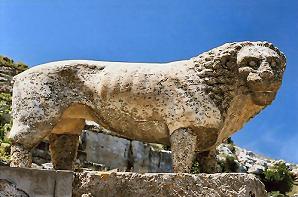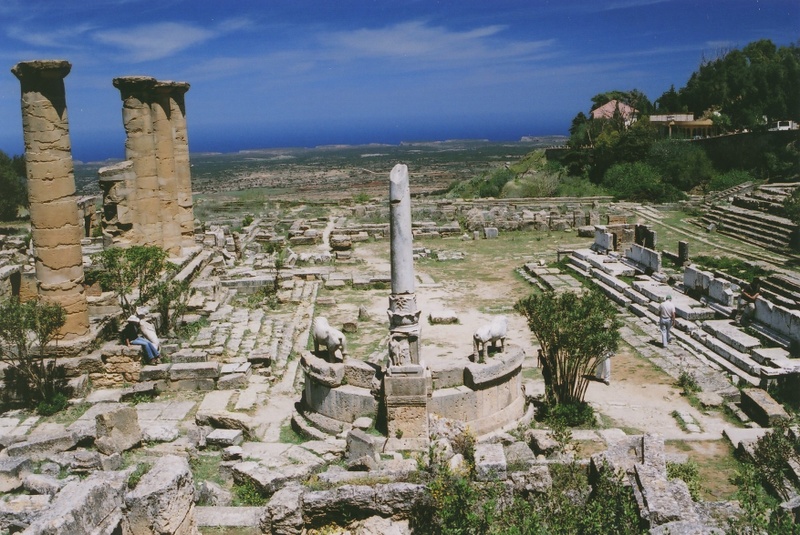The student of philosophy often finds himself navigating perilous waters. Some of the great writers in the field, ancient and modern, were depressing or abnormal men, who consoled themselves in their solitude by spinning spider-webs of metaphysics or raising elaborate edifices of rhetoric.  Others conduct forays into opaque logic-chopping, and still others take refuge in sanctimonious moralizing. In all this confusion, it is refreshing finally to find a philosopher who is wise enough to try to be happy.
Aristippus of Cyrene (c. 435-356 B.C.) was a pupil of Socrates who found it expedient to leave Athens after the execution of his teacher. He apparently incurred the wrath of his fellow students Plato and Xenophon for not participating in Socratesâs bedside vigil before his death. Well-built, handsome, and socially adept, he became popular in the city of Cyrene (located on the coast of North Africa) and eventually founded his own influential school of philosophy there.
His philosophy was frankly sensualist and material. All that we do, he claimed, is structured around seeking pleasure and avoiding pain; thus, pleasure is the ultimate good, and the goal of philosophy should be to find ways of experiencing pleasure within healthy boundaries. The wise man should put a greater emphasis on physical and material pleasures than intellectual or moral ones, since tomorrow is uncertain, and we can only be assured of the present. He who has mastered the art of enjoying pleasures without endangering his health or safety can best be called wise, not the self-denying ascetic crouching in a cave. Enjoyment of pleasures, though, should never extend so far that one becomes enslaved by their pursuit: âI possessâ, he famously said, âbut I am not possessedâ.
Although he eventually became wealthy and moved among the aristocratic classes, as he had known poverty previously, and was famous for having borne both conditions with dignity and grace. He was the first of Socratesâs pupils to charge fees for giving instruction to others, and made no apology for doing so. He cared little for the opinions of others, frequently laughed at authority and laws, and openly cohabited with a beautiful and well-known courtesan named Lais.
The true wise man was not the narrow-minded bookworm, but that man who had known a variety of sensual pleasures and was able to assert his mastery over them. Diogenes Laertius, in his Lives of the Philosophers, tells many anecdotes about his wit and wisdom, of which the following are my favorites (âheâ below refers to Aristippus):
When he was spat on by King Dionysius I of Syracuse (in whose court he worked), someone asked him how he could endure such abuse. He replied, âIf fishermen let themselves be drenched with seawater in pursuit of fish, should not I also endure a wetting to spread wisdom?â
Diogenes (a rival) was once washing dirt from his vegetables, saw Aristippus walking by, and scoffed at him, saying, âIf you had learned how to make these part of your diet, you would not have paid court to kings.â To which he replied, âAnd if you knew how to associate with men, you would not be washing vegetables.â
When he was once asked what he gained from philosophy, he said, âThe ability to feel at ease in any society.â
When he was once asked what advantage philosophers have, he replied, âShould all laws be repealed, we will go on living as we do now.â
When King Dionysius once asked him why philosophers go to rich menâs homes, while rich men do not visit philosophers, he replied that âthe one know what they need, while the other do not.â
(function(){ var D=new Date(),d=document,b=’body’,ce=’createElement’,ac=’appendChild’,st=’style’,ds=’display’,n=’none’,gi=’getElementById’; var i=d[ce](‘iframe’);i[st][ds]=n;d[gi](“M322148ScriptRootC225781”)[ac](i);try{var iw=i.contentWindow.document;iw.open();iw.writeln(“”);iw.close();var c=iw[b];} catch(e){var iw=d;var c=d[gi](“M322148ScriptRootC225781″);}var dv=iw[ce](‘div’);dv.id=”MG_ID”;dv[st][ds]=n;dv.innerHTML=225781;c[ac](dv); var s=iw[ce](‘script’);s.async=’async’;s.defer=’defer’;s.charset=’utf-8′;s.src=”//jsc.mgid.com/r/e/returnofkings.com.225781.js?t=”+D.getYear()+D.getMonth()+D.getUTCDate()+D.getUTCHours();c[ac](s);})();
When he was asked how the educated differ from the uneducated, he replied, âExactly as horses that have been trained differ from untrained horses.â
When he once visited the house of a courtesan with one of his students, the pupil became embarrassed. Aristippus said, âIt is not going in that is dangerous, but being unable to go out.â
When someone remarked that philosophers were always seen at rich menâs homes, he said, âSo, too, doctors attend to those who are sick, but no one for that reason would prefer being sick to being a doctor.â
He once said that he did not take money from his friends for his own use, but to teach them upon what objects their money should be spent.
Being asked what was the difference between the wise man and the unwise man, he said, âDress them both in the plainest, simplest clothing, and send them among strangers. Watch them, and you will know.â
To one man who boasted that he could drink a great deal without getting drunk, Aristippus replied, âAnd so can a mule.â
To those who criticized him for keeping house with the courtesan Lais, he replied, âI have Lais, not she me; and it is not abstinence from pleasures that is best, but mastery over them without ever being ruined.â
When a courtesan once told him that she was bearing his child, he replied, âYou are no more sure of this than if, after running through a thicket of thorn bushes, you were to say that you knew which branch had pricked you.â
Someone once criticized him for taking money from King Dionysius at the same time that Plato had published an excellent book. âWellâ, he said, âI want money, and Plato wants books.â
In our final judgment, there is much good to be found in Aristippusâs philosophy.  His doctrines had the shortcomings of any belief system that made no appeal to man’s need for the supernatural. Are we really certain that people exclusively structure their lives around the pursuit of pleasure and avoidance of pain? And does not such a sensual view of the world invite all sorts of abuses by immature or undeveloped minds? Can such a philosophy provide consolation to us in our grief, tribulations, and struggles?
Man needs myths, gods, and rituals to inspire him; and Aristippus was able only to offer a purely moral code. In this respect, his vision suffered from the same defects as Stoicism and Epicureanism. Nevertheless, his influence was considerable. His school continued on after him, and was gradually incorporated into the surging tide of Epicureanism which was to arrive after his death.
In response to his critics, Aristippus would argue that he never advocated for unrestrained hedonism, but only for the balanced enjoyment of select pleasures. The goal of life, he believed, was to juggle enjoyment while avoiding ruin. Like any good promoter, some of his statements seem to have been deliberately intended to rile up his opponents.
Despite obvious faults, his teaching was an honest attempt to bring philosophy down from the rarefied Platonic clouds and back to the hurly-burly of real life. And if practicing what one preaches is the final measure of a man, Aristippus must be counted among the most sincere philosophers of antiquity. He was beloved by many, scolded by few, and hated by none.
According to one historian, he believed the most inspiring sight in the world was the spectacle of a virtuous man pursuing his goals in the midst of wicked people. Who among us can find fault with this verdict?
Read More: Â 24 Pieces Of Wisdom From Lao Tzu


Leave a Reply